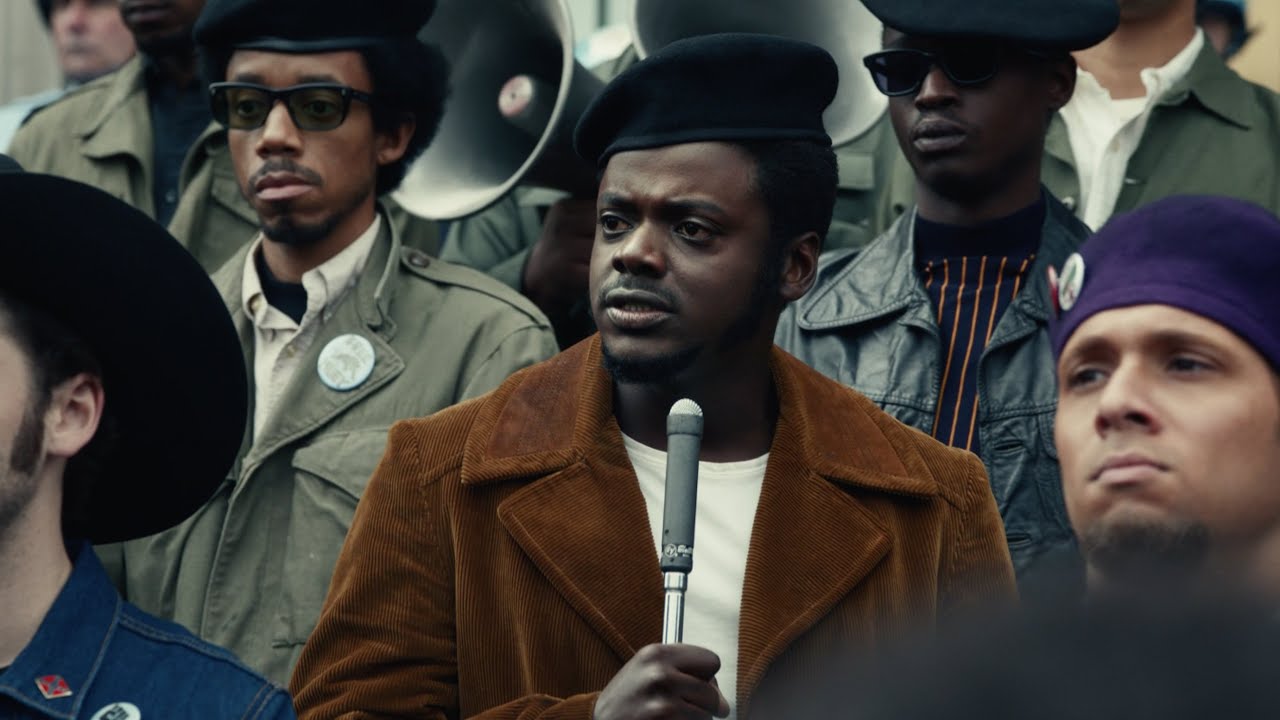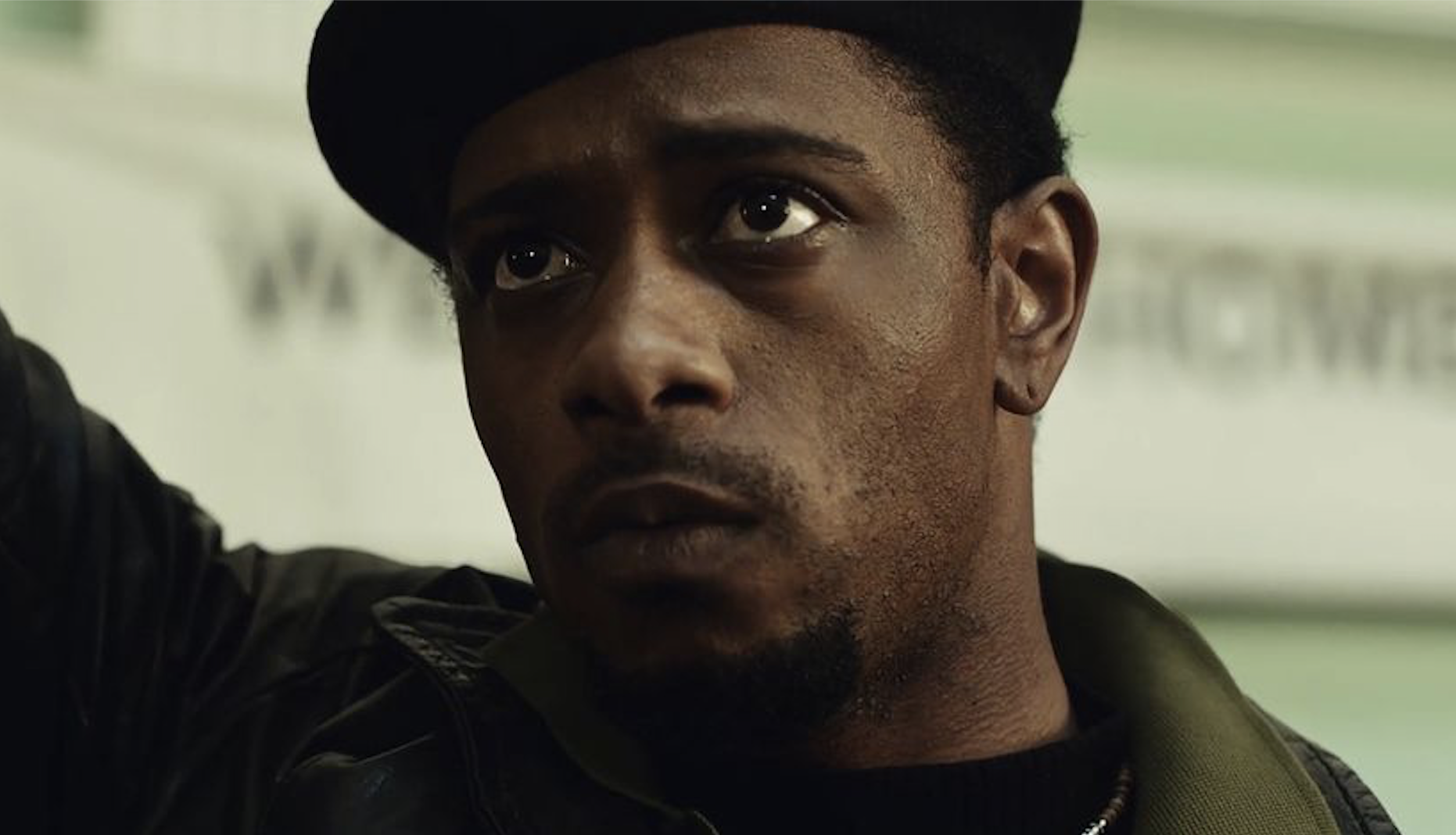Somehow, writer-director Shaka King, the Lucas Brothers, and Will Berson wrote one movie, “Judas and the Black Messiah.” Disparate perspectives on Fred Hampton meant that outcome was by no means pre-ordained, but after more than eight years and countless drafts they agreed to coalesce around a single narrative so compelling that a studio would be forced to greenlight the movie.
Two powerful producers, Ryan Coogler (“Black Panther”) and Charles King (“Mudbound”), backed director Shaka King, who kept on track a complex story that kept changing, especially after two people joined the team who knew it better than anyone: Chairman Fred Hampton Jr. and his mother, Deborah Johnson, now known as Akua Njeri.
This collaboration yielded a film that debuted at Sundance 2021 to rave reviews, landed in theaters and HBO Max on February 12, and on March 15 earned six Oscars including Best Picture, Original Screenplay, Best Supporting Actor (Daniel Kaluuya and LaKeith Stanfield), Original Song, and Cinematography (Sean Bobbitt).
Here’s how it happened.
Two groups of writers wanted to tell the story of Fred Hampton. For years, New Yorker Will Berson labored over a spec biopic; Jermaine Fowler sent it to a mutual friend, Shaka King. He also was developing an idea from Kenny and Keith Lucas, a stand-up comedy duo. They focused on the pivotal conflict between FBI informant William O’Neil, who infiltrated the Illinois chapter of the Black Panther Party and befriended its chairman, Fred Hampton, who was only 21 in 1968 when the FBI assassinated him in Chicago.
Back in 2012, after the shooting of Trayvon Martin, Berson and the Lucas brothers all knew that the world had changed. “We were struck by the inherent tragic nature” of Hampton’s untimely killing,” said Kenny Lucas on the phone. “We were floored by his age, and his activity up until that age as an organizer, what he did for the community. He felt an obligation to figure out a way that his message could be amplified in a national, even international way. We thought it spoke to the time and history and all the injustices that were occurring.”

Kenny Lucas, left, and Keith Lucas
Evan Agostini/Invision/AP
Berson, the son of a librarian who taught him the value of research, was surprised by how little had been written about Fred Hampton and what he accomplished in a short time. “He was as close as you can get to a secular saint,” he said. “He was really revolutionary. He was moving to me as an Atheist Jew.” Berson penned a conventionally structured Hampton biopic with J. Edgar Hoover as the archvillain, and William O’Neil as a key character. “In my mind I was making a Michael Mann movie by way of Julian Schnabel, with Hoover and Hampton never meeting.”
Meanwhile, as their comedy and acting careers began to thrive, the Lucas brothers soaked up wisdom from such mentors as Judd Apatow. “He was drilling into us storytelling elements,” said Keith, “how to reduce to the simplest elements, the best way to tell the simplest story.” In 2013, they watched William O’Neil’s interview in the 1987 Civil Rights documentary “The Eyes on the Prize” and wondered if they could pour the O’Neil and Hampton story into Blake Snyder’s famous “Save the Cat” 15-story beat template. Over nearly a dozen outlines, they saw their story come to life by telling it from O’Neil’s perspective. “It’s like a math problem,” said Kenny. “You have the history, and figure out the logical form to run it through until the story clicks by the third act.”

“Judas and the Black Messiah”
They pitched it to A24 and Netflix back in 2014, selling it as “The Conformist” meets “The Departed,” but got nowhere. They met and bonded with King on an FX pilot in 2016, and told the director about their project. King was intrigued and worked with them to take their two-page outline to seven pages. King avoided reading the various Hampton scripts in development, he said, which had folks from Forest Whitaker to Antoine Fuqua attached, but he looked at Berson’s script when Fowler sent it to him.
“He had done a lot of research,” said Shaka King. “I liked how he had written Deborah. Fred’s parents were major characters. I wanted someone to help me to get a screenplay for a two-hour movie on the page and shape it. We were moving toward doing actual work halfway into our first meeting, making different plotlines.” King talked Berson into coming on board. They spent a week in a Los Angeles Airbnb, putting the Lucas outline on cards, adding Post-It notes, grabbing iPhone pictures, and then sending each other drafts to rework.
Berson’s TV experience prepared him for the collaborative chaos of a writers’ room. King removed a lot of exposition from Berson’s first act, making it less about Hoover and more about the Black Panthers. King liked using O’Neil as a framing device to manipulate audiences into thinking they are watching his story. “People are used to watching movies that way,” he said. “It’s an undercover genre way to do it — and the only way to get it greenlit. Fred Hampton didn’t have name recognition. Going in that direction and doing it that way, you can cut trailers and get people excited about the movie. Otherwise, they’re not attracted to the material. It was the way to get it to more people, not a Fred Hampton biopic.”
By Sundance 2013, King and Berson rejiggered the “vomit draft” that became the script they kept reworking through development with producers King and Coogler, until they were ready to pitch the studios. “Something about cops and robbers resonates,” said Keith Lucas. “You know it, you feel it, you get it. They did a great job of inverting it, making the protagonist the bad guy, turning the traditional FBI heroes into villains. It’s a common genre and that was the key to it being attractive to the studios and to the Academy.”
Berson figured with Daniel Kaluuya, LaKeith Stanfield, and Coogler attached, the movie would spark a bidding war. It didn’t, but Warner Bros. motion picture chief Toby Emmerich agreed to develop the project. After a great table read, he greenlit the movie with a $26 million budget, modest for a period picture. “All the studios passed, except Warner Bros.,” said Shaka King, who fantasized about what he could have done with the $100-million budget of “Once Upon a Time in Hollywood. “That’s the thing with Black people. They are asked to do more with less.”

Lakeith Stanfield in “Judas and the Black Messiah”
Warner Bros.
After King convinced Chairman Fred Hampton Jr. and his mother to join the process a week into shooting the film, more changes were needed, “That was a challenge,” said King, “being faithful to history. Chairman Fred got involved in making sure they felt we were not doing damage to their legacy. We did some serious juggling. I want to make — the studio, producers, and the family — we have to make one movie.”
Once the movie was scheduled for a January Sundance 2021 debut and Black History month release in February, its reception was upbeat, not only from critics and audiences but awards voters who quickly rallied behind Kaluuya, who swept the Oscar precursors.
After an inclusive 10 PGA nominees, including “Judas,” the Lucases expected as many as three Black films to contend for Best Picture. “We thought this would be a watershed year for the Academy, with more spaces for Black films,” said Keith. “We didn’t think we’d be the only one. We thought ‘One Night in Miami’ and ‘Ma Rainey’s Black Bottom’ were certainties. The Academy was going to be the Academy. They weren’t going to evolve as quickly as we thought they were. But it’s historic that the most people of color were nominated for writing awards. Kudos to the Academy.”
Finally, “Judas and the Black Messiah” — the first Oscar nominated movie produced by all Black producers — made the cut by virtue of not being a talky screen adaptation of a play, trapped inside a room, but rather a Trojan Horse. “We made it based on genre,” said Keith Lucas. “The history of the Academy is littered with police procedurals.”
Two powerful producers, Ryan Coogler (“Black Panther”) and Charles King (“Mudbound”), backed director Shaka King, who kept on track a complex story that kept changing, especially after two people joined the team who knew it better than anyone: Chairman Fred Hampton Jr. and his mother, Deborah Johnson, now known as Akua Njeri.
This collaboration yielded a film that debuted at Sundance 2021 to rave reviews, landed in theaters and HBO Max on February 12, and on March 15 earned six Oscars including Best Picture, Original Screenplay, Best Supporting Actor (Daniel Kaluuya and LaKeith Stanfield), Original Song, and Cinematography (Sean Bobbitt).
Here’s how it happened.
Two groups of writers wanted to tell the story of Fred Hampton. For years, New Yorker Will Berson labored over a spec biopic; Jermaine Fowler sent it to a mutual friend, Shaka King. He also was developing an idea from Kenny and Keith Lucas, a stand-up comedy duo. They focused on the pivotal conflict between FBI informant William O’Neil, who infiltrated the Illinois chapter of the Black Panther Party and befriended its chairman, Fred Hampton, who was only 21 in 1968 when the FBI assassinated him in Chicago.
Back in 2012, after the shooting of Trayvon Martin, Berson and the Lucas brothers all knew that the world had changed. “We were struck by the inherent tragic nature” of Hampton’s untimely killing,” said Kenny Lucas on the phone. “We were floored by his age, and his activity up until that age as an organizer, what he did for the community. He felt an obligation to figure out a way that his message could be amplified in a national, even international way. We thought it spoke to the time and history and all the injustices that were occurring.”

Kenny Lucas, left, and Keith Lucas
Evan Agostini/Invision/AP
Berson, the son of a librarian who taught him the value of research, was surprised by how little had been written about Fred Hampton and what he accomplished in a short time. “He was as close as you can get to a secular saint,” he said. “He was really revolutionary. He was moving to me as an Atheist Jew.” Berson penned a conventionally structured Hampton biopic with J. Edgar Hoover as the archvillain, and William O’Neil as a key character. “In my mind I was making a Michael Mann movie by way of Julian Schnabel, with Hoover and Hampton never meeting.”
Meanwhile, as their comedy and acting careers began to thrive, the Lucas brothers soaked up wisdom from such mentors as Judd Apatow. “He was drilling into us storytelling elements,” said Keith, “how to reduce to the simplest elements, the best way to tell the simplest story.” In 2013, they watched William O’Neil’s interview in the 1987 Civil Rights documentary “The Eyes on the Prize” and wondered if they could pour the O’Neil and Hampton story into Blake Snyder’s famous “Save the Cat” 15-story beat template. Over nearly a dozen outlines, they saw their story come to life by telling it from O’Neil’s perspective. “It’s like a math problem,” said Kenny. “You have the history, and figure out the logical form to run it through until the story clicks by the third act.”

“Judas and the Black Messiah”
They pitched it to A24 and Netflix back in 2014, selling it as “The Conformist” meets “The Departed,” but got nowhere. They met and bonded with King on an FX pilot in 2016, and told the director about their project. King was intrigued and worked with them to take their two-page outline to seven pages. King avoided reading the various Hampton scripts in development, he said, which had folks from Forest Whitaker to Antoine Fuqua attached, but he looked at Berson’s script when Fowler sent it to him.
“He had done a lot of research,” said Shaka King. “I liked how he had written Deborah. Fred’s parents were major characters. I wanted someone to help me to get a screenplay for a two-hour movie on the page and shape it. We were moving toward doing actual work halfway into our first meeting, making different plotlines.” King talked Berson into coming on board. They spent a week in a Los Angeles Airbnb, putting the Lucas outline on cards, adding Post-It notes, grabbing iPhone pictures, and then sending each other drafts to rework.
Berson’s TV experience prepared him for the collaborative chaos of a writers’ room. King removed a lot of exposition from Berson’s first act, making it less about Hoover and more about the Black Panthers. King liked using O’Neil as a framing device to manipulate audiences into thinking they are watching his story. “People are used to watching movies that way,” he said. “It’s an undercover genre way to do it — and the only way to get it greenlit. Fred Hampton didn’t have name recognition. Going in that direction and doing it that way, you can cut trailers and get people excited about the movie. Otherwise, they’re not attracted to the material. It was the way to get it to more people, not a Fred Hampton biopic.”
By Sundance 2013, King and Berson rejiggered the “vomit draft” that became the script they kept reworking through development with producers King and Coogler, until they were ready to pitch the studios. “Something about cops and robbers resonates,” said Keith Lucas. “You know it, you feel it, you get it. They did a great job of inverting it, making the protagonist the bad guy, turning the traditional FBI heroes into villains. It’s a common genre and that was the key to it being attractive to the studios and to the Academy.”
Berson figured with Daniel Kaluuya, LaKeith Stanfield, and Coogler attached, the movie would spark a bidding war. It didn’t, but Warner Bros. motion picture chief Toby Emmerich agreed to develop the project. After a great table read, he greenlit the movie with a $26 million budget, modest for a period picture. “All the studios passed, except Warner Bros.,” said Shaka King, who fantasized about what he could have done with the $100-million budget of “Once Upon a Time in Hollywood. “That’s the thing with Black people. They are asked to do more with less.”

Lakeith Stanfield in “Judas and the Black Messiah”
Warner Bros.
After King convinced Chairman Fred Hampton Jr. and his mother to join the process a week into shooting the film, more changes were needed, “That was a challenge,” said King, “being faithful to history. Chairman Fred got involved in making sure they felt we were not doing damage to their legacy. We did some serious juggling. I want to make — the studio, producers, and the family — we have to make one movie.”
Once the movie was scheduled for a January Sundance 2021 debut and Black History month release in February, its reception was upbeat, not only from critics and audiences but awards voters who quickly rallied behind Kaluuya, who swept the Oscar precursors.
After an inclusive 10 PGA nominees, including “Judas,” the Lucases expected as many as three Black films to contend for Best Picture. “We thought this would be a watershed year for the Academy, with more spaces for Black films,” said Keith. “We didn’t think we’d be the only one. We thought ‘One Night in Miami’ and ‘Ma Rainey’s Black Bottom’ were certainties. The Academy was going to be the Academy. They weren’t going to evolve as quickly as we thought they were. But it’s historic that the most people of color were nominated for writing awards. Kudos to the Academy.”
Finally, “Judas and the Black Messiah” — the first Oscar nominated movie produced by all Black producers — made the cut by virtue of not being a talky screen adaptation of a play, trapped inside a room, but rather a Trojan Horse. “We made it based on genre,” said Keith Lucas. “The history of the Academy is littered with police procedurals.”


